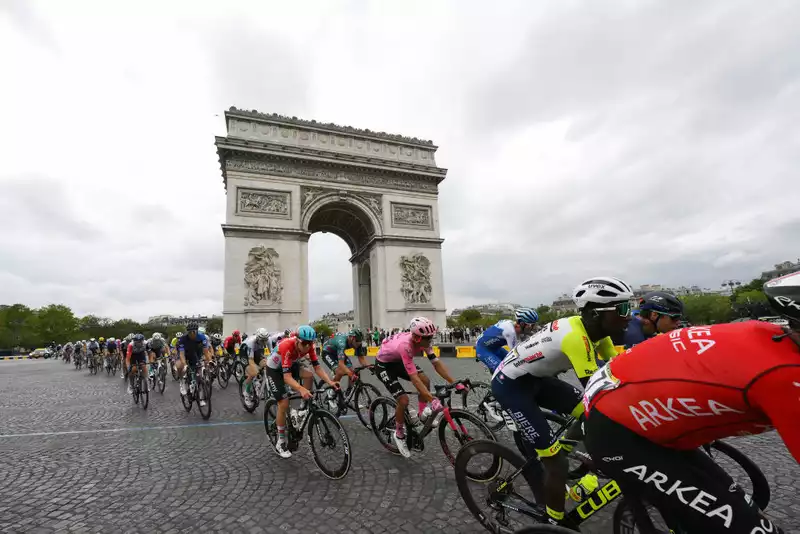This week's report revealed the behind-the-scenes push to overhaul the business model of professional cycling. The scheme, led by Richard Plugge, CEO of Jumbo-Visma, and Zdenek Bakala, a wealthy backer of Soudal-QuickStep, is designed to bring massive amounts of venture capital into the sport to support the increasingly dire economics.
The details of the plan are still unknown, but Plugge and EF Education-EasyPost CEO Jonathan Vaughters spoke to the "Radio Cycling" podcast, which reveals some new information.
The plan is to combine a number of teams and events into a more easily digestible format accessible to new viewers, such as those present in the current WorldTour
The doctrine of this scheme is very similar to the origins of the World Tour dating back to 2004 and allows top riders and teams to spend the year. We guarantee that you have participated in the same series of races throughout the year.
According to Vaughters, there is one important difference in that Plugge's project is aimed at bundling the race into one package to sell rights to broadcasters and bring revenue that can be shared with the team - all of these are from the breakaway League where Baccarat threw his weight in 2011. It still sounds very familiar to those who followed the last attempt at it.
This time seems more serious, Reuters reports that the consulting group is suing for interest from investors in the impending deadline, according to the podcast, which is trying to raise €600 million to bring Giro d'Italia organizer RCS Sport to the fold. You can do it.
However, both the UCI, which was discovered on the Pro tour between 2004 and 2008, and the team discovered in the 2012 attempted withdrawal league, would not change without the Tour de France organizer ASO.
Plugge revealed on the podcast that he has already spoken with ASO's head of strategy Yann Moenner and plans to hold further discussions with the ASO and UCI "within the next week."
"The world is changing around us, and our competitors are not other teams or organizers," says Plugge. "Our competitors are football and rugby, the NFL and Formula 1. So, we need to make sure we are "ready for the future" as a sport. And I think [Uci Chairman David] Lappartient has some ideas about it. Yann[Moenner] - Many people have some ideas about it. But we need to make sure that in 5 years this sport will be bigger than it is today and everyone will benefit from it.
Waters rescued the team from near the end of the season, but said he fully supported the proposal.
"I can speak for the team and I can speak for a lot of events on the calendar that are really struggling to make ends meet. Cycling has always persisted off of this sponsorship revenue model, and while it applies to teams, it also applies to smaller races where you have to find sponsorship revenue to generate events.
"This is not about people getting rich from this equation. It's about stabilizing the economy so that we don't run into a situation where Jumbo Visma almost goes bankrupt at the end of the season," Vaughters said, adding that HTC-Highroad was in the same situation in 2011 and eventually broke up.
"This is about stabilizing the economic base of the sport, and it's good for everyone. So, of course, we are going to be very active and move forward."
Vaughters says it's already related to previous breakaway league efforts and the current idea isn't exactly the same.
As an aside, he described the scheme as "not [a league] at all because it functions under the umbrella of the World Tour" and described it as necessary for the future of the sport.
"In other sports, media rights or broadcast rights are the main source of income. The cycling broadcast rights are almost entirely occupied by large race promoters, and the team has not received any distribution of it at all.
"In this case, teams, athletes, and small race allies bundle all of these media rights into a package."
A single team or a race like the GP de Plouay, a day race of a smaller world tour, may not have much value alone," he said, "but the 18 series." Packaging it together creates more interest and greater value than trying to do it individually.
"That's why everyone should be interested in this - you start generating a source of income without relying solely on sponsorship."
the changes could be met with resistance from teams who don't want to risk their current meagre budget or go against the ASO. Already within the Association International des Groupes Cyclistes Professionals (Aigcp) team Association, a pushback has been made to Plugge, the current president.
"Even if [Plugge] is a divisive figure, I don't think it should undermine this proposal and this method," says Vaughters.
"This is a necessary step for cycling and any sort of personal conflict that people may have with Richard, I hope they can put them aside to take this step forward and start building a collective that will make the whole sport better.""
.

Comments